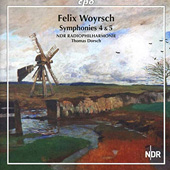
ESSENTIAL RECORDINGS

German composer, organist and choir director Felix Woyrsch (1860-1944) was born the same year as Gustav Mahler, but unlike Mahler who imposed his own personal, forward looking ideology on music and thus completely transformed, retooled, and updated the symphony to 20th century code, Felix Woyrsch chose to stick to the tried and true symphonic structures and standards established by his predecessors Beethoven, Brahms and Bruckner, and add some remodelling touches of his own. For example the slow movement of his Symphony No. 4 in F Major, Op. 71 marked 'Langsam, ausdrucksvoll' (Slow and expressive) has a quasi-Wagnerian mythical feel to it's development deployed in a quiet yet varied manner outstripping even the best efforts by Bruckner. He had a way of moving the music along through subtle variety instead of repetition. Not bad for someone who, as the booklet notes mention, was essentially a self-taught composer, having enjoyed only basic and intermittent violin and piano lessons as a child. His prime and personal homework material was the study of scores from Palestrina to Berlioz, and attentive listening whenever possible.
And again, when listening to the slow movement of the Symphony No. 5 in D Major, Op. 75 one can perceive a melodic refinement and enhanced orchestration skills. And despite it's final movement setting off with a theme definitely "classical" in style, the composer's skill at ingenious harmonic and dynamic development builds everything to a polished and impressive conclusion. For a composer that was definitely out of sync with the times, his music holds way more substance than one would suspect. This is the fourth in a series of recordings on the CPO label devoted to the music of Felix Woyrsch covering his chamber and orchestral works with more to come, all worth investigating. Another prime example of a neglected composer whose music deserves to be pulled from the archives, dusted off, and newly evaluated.
Jean-Yves Duperron - January 2019